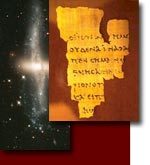| Site Map | Contacts | Links | Newsletter | |
Genesis 1:2
And a Mighty Wind
Hebrew Text
Myhla jwrw - and a mighty windThe Hebrew word hwr can mean "breath, wind, or spirit" (BDB, 924). Its most basic meaning is "blowing, air in motion, wind" (NIDOTTE, 3:1073). To the ancient Hebrews breath, wind, and spirit were the same (Gaster, 1969, 5). There is no article in the Hebrew which indicates "wind" not "The Spirit" as well as the following Hebrew participle tpjrm denoting motion. It is interesting to note that the Hebrew and Akkadian word for "day" mwy and umum, respectively, can mean "wind" (Hildegard and Lewy, 1943, 5). The word <yhla can also be used as a superlative describing the wind, therefore meaning "a mighty wind" or "raging storm." Moscati and Freeman argue against taking it as an elative because of the context (1947, 305-10; 1996, 9-13). The only other exact Hebrew phrase with vav mentioned in the Masorah is in 2 Chronicles 24:20 where the Spirit of God comes upon Zechariah (Kelley, Mynatt, and Crawford, 1998, 113). There are six other references listed, Gen. 41:38, Ex. 31:3;35:31; Num. 24:2; Ezek. 11:24; and 2 Chr. 15:1. Psalm 33:6 says, "By the word of the Lord were the heavens made, their starry host by the breath of his mouth" (NIV). Here "word" and "breath" are used in parallel. Job 26:13 states, "By his breath the skies became fair" (NIV). Clearly, in this passage the wind which is considered God’s breath is blowing the clouds away causing fair skies.
LXX Text
pneuma qeou - a wind from God
The LXX has translated the Hebrew phase as pneuma qeou with no article as the Hebrew which seems to indicate that "a wind from God" was meant (Wevers, 1993, 2).
AramaicTexts
ywy mdq nm ajwrw - and the wind from before Yahweh
Grossfeld in his notes states that ajwr means "wind" not "spirit" even though it has an article in the Targum Onqelos (1988, 42).
In the Targum Neofiti I McNamara translates, "and a spirit of mercy from before the Lord was blowing over the surface of the waters" (1992, 52).
In the Targum Pseudo-Jonathan Maher translates, "and a merciful wind from before God was blowing over the surface of the water" (1992, 16). This same phase "merciful wind" occurs in Genesis 8:1 to dry the flood waters.
In the Fragment-Targums Klein translates, "and a merciful wind from before the Lord was blowing over the surface of the waters" (1980, 3).
The Targums seem to believe by their translation that "a wind from the Lord was blowing" not the "Spirit of God" moving.
Jewish Literature
Josephus in Jewish Antiquities writes, pneumatos d’ authn anwqev epiqeonyos, meaning "a wind (or breath) from above was moving over it." Framxman notes, "The alteration of the ruah `elohim to a Žbreath from above (anothen)’ cannot help call to mind the similar effort employed by the Targumim to interpret this 'breath' as something a bit apart and distinct from God himself" (1979, 39).
Philo renders it "life-breath" and comments, "The one he entitles the 'breath of God', because breath is most life-giving, and of life God is the author" (On The Creation, 30; LCL, 23).
In Genesis Rabbah Rabban Gamaliel understands ruah as "wind" referring to Amos 4:13 (I.IX; Neusner, 1985, 13). R. Judah b. R. Simon understands it in light of Genesis 8:1 "And God made a wind pass over the earth" (Ibid, 23).
The Babylonian Talmud in Hagigah 12a translates, "And the wind of God hovered over the face of the waters" (Epstein, 1935, 63)
Next - Was Blowing Upon the
Surface of the Waters
Bibliography
